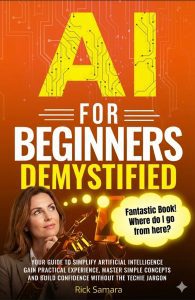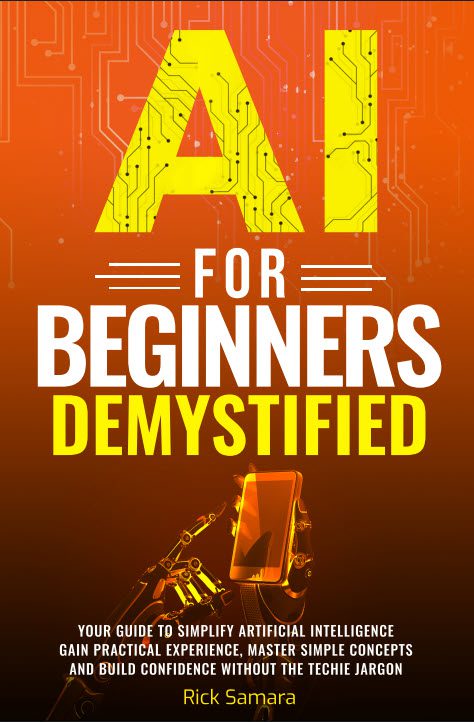 Hey there, fellow AI explorer! Rick Samara here — the guy who wrote AI for Beginners Demystified because I got tired of watching good people freeze up every time someone mentioned “machine learning” over coffee or a beer. Or they thought AI was coming for their jobs. As you know, I explained that in the first chapter of my book. Well, buckle up. The thing that has me absolutely giddy right now, the thing I stay up way too late learning about, is the Personal AI Agent.
Hey there, fellow AI explorer! Rick Samara here — the guy who wrote AI for Beginners Demystified because I got tired of watching good people freeze up every time someone mentioned “machine learning” over coffee or a beer. Or they thought AI was coming for their jobs. As you know, I explained that in the first chapter of my book. Well, buckle up. The thing that has me absolutely giddy right now, the thing I stay up way too late learning about, is the Personal AI Agent.
If you just finished my book (or you’re halfway through and already hooked), this is the very next mountain you’re going to want to climb. This is the hottest trend for beginners moving into intermediate AI, and for good reason: it’s the moment AI stops being a cool toy and starts becoming a tireless, brilliant, slightly sarcastic sidekick.
Personal AI Agent
Artificial Intelligence is advancing faster than ever, and one of the most exciting developments—especially for readers stepping beyond the beginner stage—is the rise of the Personal AI Agent. These are not just chatbots or tools you use occasionally. A Personal AI Agent is a digital assistant that remembers your preferences, learns your habits, performs tasks on your behalf, and automates the daily work that slows you down.
This is the hottest trend for beginners moving into intermediate AI, or moving from a Beginner to an actual Practitioner. 
And yes—your AI agent won’t ask for a raise, but it may ask for more RAM.
What Makes a Personal AI Agent Different From Your Favorite AI Application, or Chatbot?
ChatGPT, Claude, Grok, Gemini (Chatbots) — they’re all fantastic. But they’re like walking into a Genius Bar every single time you need something.
A Personal AI Agent is different because it knows you.
 It’s not just responding — it’s anticipating. It’s acting on your behalf while you’re in the shower, walking the dog, or (heaven forbid) actually sleeping.
It’s not just responding — it’s anticipating. It’s acting on your behalf while you’re in the shower, walking the dog, or (heaven forbid) actually sleeping.
Note: Try this! Ask your Chatbot to build you a personal AI agent or assistant. You could also play with variations. For example, rather than asking your Chatbot to make or build a personal AI agent or assistant, try telling it to create a GPT. I find that these terms are essentially interchangeable, which makes this all a little confusing. I used ChatGPT to do this.
I simply asked for help in building my personal AI assistant, and ChatGPT walked me through the process.
You want to upload as much information about yourself to your personal AI assistant as possible. I uploaded my bio, my book, my book overview, and my two websites. You don’t want to add those touchy personal items, like your Social Security number, bank accounts, or log-in credentials for any accounts.
What functions can a Personal AI Agent perform?
A Personal AI Agent is a customized AI system built to operate like an extension of you. It doesn’t just respond to commands—it anticipates your needs, organizes your life, and adapts over time.
Think of it as having:
-
An intelligent assistant
-
A project manager
-
A personalized researcher
-
A memory bank for your preferences
-
A task automation engine
All rolled into one.
Unlike traditional digital assistants, these agents are persistent—they remember. They can build a profile of your routines, your tone, your business style, and even your goals. That “memory layer” is what transforms AI from a tool into a partner.
Your Tone is Important
This is how I did it in ChatGPT. I named my personal assistant AI Assistant Pro. Inside my assistant, I asked, “How do I set my voice or tone?”
It responded:
Tell me directly what tone you want
You can define it in a sentence or two.
For example:
-
“Use a warm, conversational tone with a touch of humor.”
-
“Sound like my writing in my book — friendly, clear, and beginner-friendly.”
-
“Keep things simple, upbeat, and confidence-building.”
I’ll lock that in and use it for all future responses (unless you tell me otherwise).
I responded, “Use a warm, conversational tone with a touch of humor, and sound like the writing in my book, clear and beginner-friendly.” That’s it. Try it. It’s easy, and it works.
Why People Are Fascinated by Personal AI Agents
They Turn Everyday Chaos Into Order
Imagine waking up and having your AI agent already:
-
Sorted your email
-
Summarized your appointments
-
Drafted replies
-
Organized follow-ups
-
Recommended which tasks to prioritize
People love this because it removes the mental clutter that weighs down their day.
They Remember Everything You Don’t Want To
If you prefer emails written in a warm tone, your agent remembers.
If you like your meeting notes formatted a certain way, your agent remembers.
If you run a business and want your social posts to match a brand voice, your agent remembers.
This memory creates a powerful sense of continuity—something most digital tools lack.
They Automate Tasks Without You Lifting a Finger
From drafting messages to generating documents to scheduling reminders, your AI agent performs work independently. Examples of automated tasks include:
-
Creating weekly social media content
-
Drafting a client welcome email
-
Planning a product launch timeline
-
Summarizing research articles
-
Generating a travel plan based on your preferences
It’s like having a competent employee in your pocket—one who works instantly and around the clock.
They Feel Like a Personalized Upgrade to Your Brain
People are fascinated because the experience is intimate and powerful.
For the first time, technology feels like you, thinks like you, and acts in line with what matters to you.
This sense of digital “self-extension” is why Personal AI Agents are becoming the gateway to deeper AI adoption.
Practical Examples of a Personal AI Agent in Action
Example 1 — The Small Business Owner
A med-spa owner uses her personal AI agent to: 
-
Send booking reminders
-
Write social captions in her brand voice.
-
Auto-generate follow-up emails
-
Pull daily revenue snapshots.
-
Draft scripts for her marketing videos
Instead of hiring multiple contractors, she has one intelligent digital worker.
Example 2 — The Consultant
A consultant uses an AI agent to:
-
Summarize client meetings
-
Draft proposals
-
Build checklists
-
Deliver onboarding documents
-
Prepare slide outlines for presentations.
Each task is done automatically based on what the agent has already learned about the consultant’s style.
Example 3 — The Everyday Professional
A busy parent uses their AI agent to:
-
Build grocery lists
-
Create weekly budgets
-
Draft letters
-
Plan vacations
It lightens the cognitive load and gives time back.
The Transition From Beginner to Intermediate AI
 Personal AI Agents are the “next logical step” for anyone who enjoyed AI for Beginners Demystified.
Personal AI Agents are the “next logical step” for anyone who enjoyed AI for Beginners Demystified.
Beginners learn how to ask questions.
Intermediate users build personal AI assistants that take action.
The evolution looks like this:
Beginner: “Write this email for me.”
Intermediate: “Create a weekly email template, learn my writing style, and send me a draft every Tuesday morning.”
That leap—from reactive to proactive—is the difference an AI agent makes.
The Future of Personal AI Agents
In the near future, your personal AI agent will:
-
Analyze your calendar and optimize your week.
-
Monitor your business metrics and alert you to changes.
-
Create full marketing campaigns automatically.
-
Build custom training plans.
-
Research projects
-
Coordinate with other AI agents (yes, that’s coming)
Agents will move from “assistants” to “co-workers.”
Some will even become “managers” of other, smaller agents.
We are entering a world where your intelligence is amplified by software that thinks with you—not for you.
Conclusion
The excitement around Personal AI Agents is more than hype—it’s the sensation of stepping into the future. For readers of AI for Beginners Demystified, this is the next chapter: building a digital partner that grows with you, supports your work, and removes friction from daily life.
This is the hottest trend for beginners moving into intermediate AI.
And remember: Your AI agent won’t ask for personal time off, but it may ask for more RAM.
Sources & Citations
McKinsey & Company – The State of AI 2025
https://www.mckinsey.com/capabilities/quantumblack/our-insights/the-state-of-ai
Stanford Institute for Human-Centered AI – AI Index Report
https://hai.stanford.edu/ai-index
Microsoft – AI Trends and Future Workplace Automation
https://news.microsoft.com/source/features/ai/
Harvard Business Review – How AI Agents Will Transform Workflows
https://hbr.org


